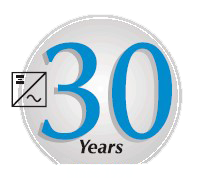If you needed to transport a load that weighed 1,000 pounds, you would use a vehicle that was designed to carry that much weight. The same principle applies to choosing an industrial power inverter to carry, say, a 10,000 watt load. For best results, you should choose an inverter that’s manufactured to carry at least that much wattage.
Most industrial power inverters are selected based a multiple criteria. However, load capacity (a.k.a. wattage rating), is a logical place to start. If an inverter can’t perform the basic function of handling the electrical load that flows through its circuits, the value it’s other specifications is negligible.
Choosing Load Capacity
Choosing an inverter based on load capacity requires a mathematical calculation of the load the inverter will carry based on the electricity conduction data of the equipment’s operating environment.
If you aren’t familiar with making the calculations, an industrial electrician can crunch the numbers for you. After the data is captured, you’ll probably hear it quantified in two basic respects, regarding the load your new inverter should carry: peak load and continuous load.
Peak Load
Also known as “surge power”, peak load is the maximum amount of wattage an inverter can carry for a short period of time — typically between a few seconds and roughly 15 minutes. Peak load is calculated to account for temporary spikes in wattage caused by such things as a power surge through a utility line, or the surge of electricity needed to start up a motor.
Typical Load
Also known as “usual power”, typical load is the amount of wattage the inverter must supply on a normal basis. Because having the right surge power capacity ensures that you have enough typical load capacity, establishing surge power capacity is usually the highest priority. It allows you to ensure your inverter won’t malfunction due to excessive wattage it isn’t designed to carry.
Conclusion
Peak load and typical load aren’t the only electricity-based performance characteristics that an industrial power inverter entails, but they are two of the most important criteria for determining how an inverter will perform daily. If you need assistance choosing an inverter based on your power requirements, the inverter specialists at Exeltech are here to help.
About Our Company
Exeltech has over 25 years of experience in manufacturing industrial power inverters. We sell stock models that are ready to ship and manufacture custom models for unique user requirements. For questions about our products, or to place an order, please call us today at (800) 886-4683, or use our contact form. We look forward to hearing from you!




